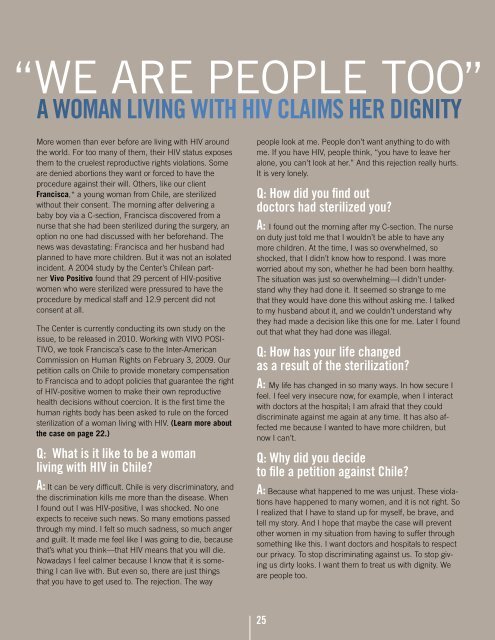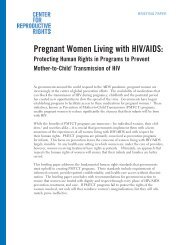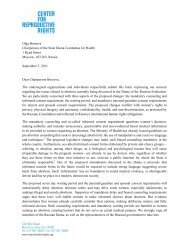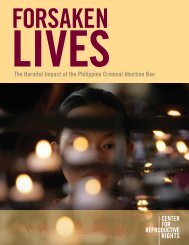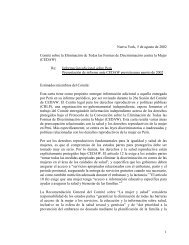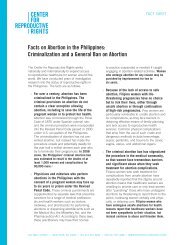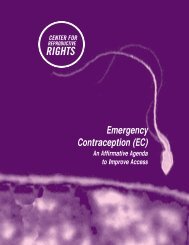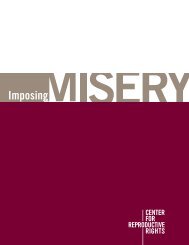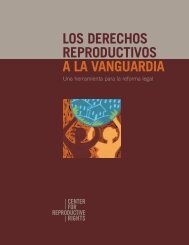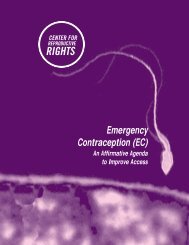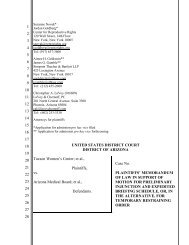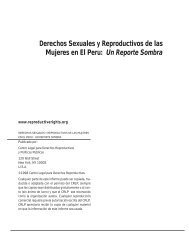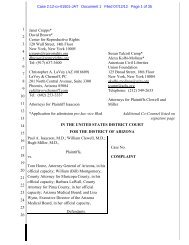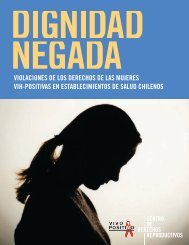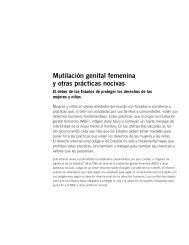CRR Annual Report 2009 - Center for Reproductive Rights
CRR Annual Report 2009 - Center for Reproductive Rights
CRR Annual Report 2009 - Center for Reproductive Rights
Create successful ePaper yourself
Turn your PDF publications into a flip-book with our unique Google optimized e-Paper software.
“We Are People Too”<br />
A Woman Living with HIV Claims Her Dignity<br />
More women than ever be<strong>for</strong>e are living with HIV around<br />
the world. For too many of them, their HIV status exposes<br />
them to the cruelest reproductive rights violations. Some<br />
are denied abortions they want or <strong>for</strong>ced to have the<br />
procedure against their will. Others, like our client<br />
Francisca,* a young woman from Chile, are sterilized<br />
without their consent. The morning after delivering a<br />
baby boy via a C-section, Francisca discovered from a<br />
nurse that she had been sterilized during the surgery, an<br />
option no one had discussed with her be<strong>for</strong>ehand. The<br />
news was devastating: Francisca and her husband had<br />
planned to have more children. But it was not an isolated<br />
incident. A 2004 study by the <strong>Center</strong>’s Chilean partner<br />
Vivo Positivo found that 29 percent of HIV-positive<br />
women who were sterilized were pressured to have the<br />
procedure by medical staff and 12.9 percent did not<br />
consent at all.<br />
The <strong>Center</strong> is currently conducting its own study on the<br />
issue, to be released in 2010. Working with VIVO POSI-<br />
TIVO, we took Francisca’s case to the Inter-American<br />
Commission on Human <strong>Rights</strong> on February 3, <strong>2009</strong>. Our<br />
petition calls on Chile to provide monetary compensation<br />
to Francisca and to adopt policies that guarantee the right<br />
of HIV-positive women to make their own reproductive<br />
health decisions without coercion. It is the first time the<br />
human rights body has been asked to rule on the <strong>for</strong>ced<br />
sterilization of a woman living with HIV. (Learn more about<br />
the case on page 22.)<br />
Q: What is it like to be a woman<br />
living with HIV in Chile<br />
A: It can be very difficult. Chile is very discriminatory, and<br />
the discrimination kills me more than the disease. When<br />
I found out I was HIV-positive, I was shocked. No one<br />
expects to receive such news. So many emotions passed<br />
through my mind. I felt so much sadness, so much anger<br />
and guilt. It made me feel like I was going to die, because<br />
that’s what you think—that HIV means that you will die.<br />
Nowadays I feel calmer because I know that it is something<br />
I can live with. But even so, there are just things<br />
that you have to get used to. The rejection. The way<br />
people look at me. People don’t want anything to do with<br />
me. If you have HIV, people think, “you have to leave her<br />
alone, you can’t look at her.” And this rejection really hurts.<br />
It is very lonely.<br />
Q: How did you find out<br />
doctors had sterilized you<br />
A: I found out the morning after my C-section. The nurse<br />
on duty just told me that I wouldn’t be able to have any<br />
more children. At the time, I was so overwhelmed, so<br />
shocked, that I didn’t know how to respond. I was more<br />
worried about my son, whether he had been born healthy.<br />
The situation was just so overwhelming—I didn’t understand<br />
why they had done it. It seemed so strange to me<br />
that they would have done this without asking me. I talked<br />
to my husband about it, and we couldn’t understand why<br />
they had made a decision like this one <strong>for</strong> me. Later I found<br />
out that what they had done was illegal.<br />
Q: How has your life changed<br />
as a result of the sterilization<br />
A: My life has changed in so many ways. In how secure I<br />
feel. I feel very insecure now, <strong>for</strong> example, when I interact<br />
with doctors at the hospital; I am afraid that they could<br />
discriminate against me again at any time. It has also affected<br />
me because I wanted to have more children, but<br />
now I can’t.<br />
Q: Why did you decide<br />
to file a petition against Chile<br />
A: Because what happened to me was unjust. These violations<br />
have happened to many women, and it is not right. So<br />
I realized that I have to stand up <strong>for</strong> myself, be brave, and<br />
tell my story. And I hope that maybe the case will prevent<br />
other women in my situation from having to suffer through<br />
something like this. I want doctors and hospitals to respect<br />
our privacy. To stop discriminating against us. To stop giving<br />
us dirty looks. I want them to treat us with dignity. We<br />
are people too.<br />
25


